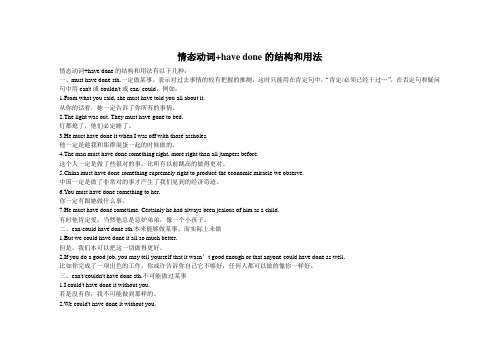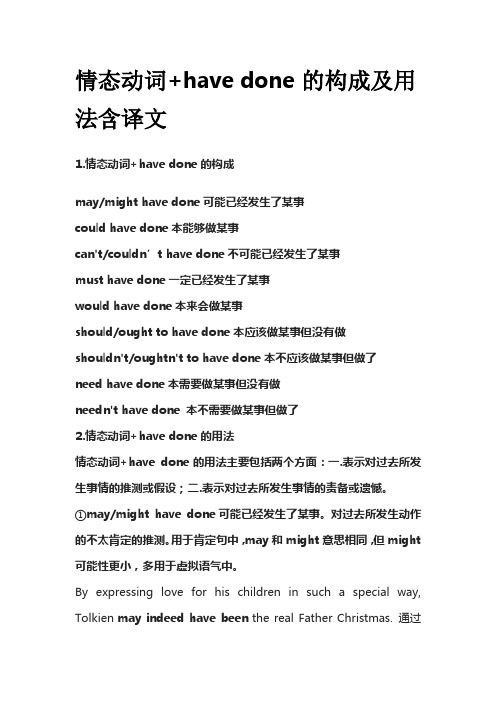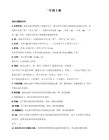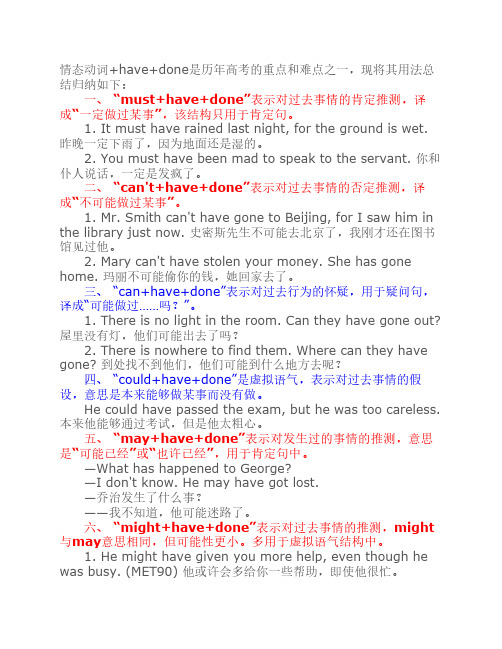解读“情态动词+have done”结构
情态动词 have done难点突破 (2)

情态动词+have done的结构和用法情态动词+have done的结构和用法有以下几种:一、must have done sth.一定做某事。
表示对过去事情的较有把握的推测,这时只能用在肯定句中,“肯定/必须已经干过…”,在否定句和疑问句中用can't或couldn't或can/ could,例如:1.From what you said, she must have told you all about it.从你的话看,她一定告诉了你所有的事情。
2.The light was out. They must have gone to bed.灯都熄了,他们必定睡了。
3.He must have done it when I was off with those assholes.他一定是趁我和那群混蛋一起的时候做的。
4.The man must have done something right, more right than all jumpers before.这个人一定是做了些很对的事,比所有以前跳高的做得更对。
5.China must have done something supremely right to produce the economic miracle we observe.中国一定是做了非常对的事才产生了我们见到的经济奇迹。
6.You must have done something to her.你一定有跟她做什么事。
7.He must have done sometime. Certainly he had always been jealous of him as a child.有时他肯定爱,当然他总是忌妒弟弟,像一个小孩子。
二、can/could have done sth.本来能够做某事,而实际上未做1.But we could have done it all so much better.但是,我们本可以把这一切做得更好。
情态动词have_done

情态动词+have+done是历年高考的重点和难点之一,现将其用法总结归纳如下:一、must+have+done表示对过去事情的肯定推测,译成“一定做过某事”,该结构只用于肯定句.1. It must have rained last night, for the ground is wet. 昨晚一定下雨了,因为地面还是湿的2. You must have been mad to speak to the servant.你和仆人说话,一定是发疯了二、“can't+have+done”表示对过去事情的否定推测,译成“不可能做过某事”。
1. Mr. Smith can't have gone to Beijing, for I saw him in the library just now. 史密斯先生不可能去北京了,我刚才还在图书馆见过他。
2.Mary can't have stolen your money. She has gone home.玛丽不可能偷你的钱,她回家去了三、“can+have+done”表示对过去行为的怀疑,用于疑问句,译成“可能做过……吗?”。
1.There is no light in the room. Can they have gone out?屋里没有灯,他们可能出去了吗?2. There is nowhere to find them. Where can they have gone? 到处找不到他们,他们可能到什么地方去呢?四、could+have+done’是虚拟语气,表示对过去事情的假设,意思是本来能够做某事而没有做.He could have passed the exam, but he was too careless.本来他能通过考试,但他太粗心五、“may+have+done”表示对发生过的事情的推测,意思是“可能已经”或“也许已经”,用于肯定句中。
情态动词 + have done

情态动词+ have done*表示推测时,“情态动词+have done”和“情态动词+do”的显著区别在于:前者表示过去的、有结果的事情的推测;后者表示对现在或将来的推测。
Harry is feeling uncomfortable. He _______________(dink) too much at the party last night. Why are your eyes are so red? You ____________________(sleep) well last night.We _______________________(visit) the museum but we spent too much time shopping.He _______________________(arrive) in Beijing.He might have given you help, even though he was very busy.Yesterday was the deadline, and he should have completed his work.We needn’t have bought so much food now that Tom won’t come and have dinner with us.*should 的其它用法表示惊异、遗憾、不满,意为“竟然,竟会”【实战演练】1. – I phoned you yesterday morning. A girl answered, but I didn’t recognize the voice.-- Oh, it ______________(be) my younger sister. She was in my room at that moment.2. (2014 陕西高考改编)My book, The House of Hades, is missing. Who ____________(take) it.3.(2013 新课标全国改编)Since nobody gave him any help, he __________________(do) the research on his own.4. (2011 新课标全国改编)They ___________(arrive) at lunchtime but their flight was delayed.5. The boy _____________(take) your book for he has been off for a week.6. Although you_______ find bargains in London, it’s not generally a cheap place to shop.7. I can’t believe it _____________(happen) in broad daylight.8. It’s strange that such a rich man ____________(be) so greedy.9. I am ashamed, sir, that I wasted the many hours when I __________________( study) in class.10. Oh, dear! It’s already twelve o’clock. Hurry up! Mother _______________(wait) anxiously.。
情态动词+have done的构成及用法含译文

情态动词+have done的构成及用法含译文1.情态动词+have done的构成may/might have done可能已经发生了某事could have done本能够做某事can't/couldn’t have done不可能已经发生了某事must have done一定已经发生了某事would have done本来会做某事should/ought to have done本应该做某事但没有做shouldn't/oughtn't to have done本不应该做某事但做了need have done本需要做某事但没有做needn't have done 本不需要做某事但做了2.情态动词+have done的用法情态动词+have done的用法主要包括两个方面:一.表示对过去所发生事情的推测或假设;二.表示对过去所发生事情的责备或遗憾。
①may/might have done可能已经发生了某事。
对过去所发生动作的不太肯定的推测。
用于肯定句中,may和might意思相同,但might 可能性更小,多用于虚拟语气中。
By expressing love for his children in such a special way, Tolkien may indeed have been the real Father Christmas. 通过这种特别的方式表达对孩子们的爱,托尔金可能真的是真正的圣诞老人。
(新外研版必修二)You can check his office. He might have been there already. 你可以去他的办公室看看。
他可能已经到那儿了。
If he had been given more encouragement, he might have made greater progress. 如果给他更多的鼓励,他可能会取得更大的进步。
“情态动词+have_done”重点讲解

1. Sorry, I’m late. I ____ have turned off the alarm clock and gone back to sleep again.( 2000春) A. might C. can B. should D. will
根据They were already five people in the car, but they managed to take me as well.一句中的时态,应该是对过去情况的推测 判断,因为车上已经有5位人了,在带上我一个,可以断定 这一定是一次不舒适的旅行。所以,本句表达的是对过去 否定的推测判断,应该用can’t/ could have done来表达。故 答案选D。
--- Catherine, I have cleaned the room for you. --- Thanks. you ___ it. I could manage it myself. ( 05福建 31题) A. needn’t do C. mustn’t do B. needn’t have done D. shouldn’t have done
2. My sister met him at the Grand Theatre yesterday, so he ____ your lecture. (2002 上海) A. couldn’t have attended B. needn’t have attended C. mustn’t have attended D. shouldn’t have attended
高考“情态动词+have_done”考点解析

2、根据句意“我妹妹昨天在大剧院见过他”,所以,一定是对过去已经发生的否定的判断,答案选A。
3、本句表达的是对过去发生过的情况的疑问,所以应该用could have done,答案选C。
It must have rained last night, for the ground is wet this morning.
昨天晚上一定是下雨了,因为今晨地面是潮湿的。
She didn’t attend the lesson yesterday. She must have been ill.
A. should B. must C. could D. would
4. I didn’t see her in the meeting-room this morning. She ____ at the meeting. (1995 上海)
A. mustn’t have spoken B. shouldn’t have spoken
A. might B. should C. can D. will
2. The window was broken. Tom ____ have done that, for he was a little naughty.
A. could B. might C. should D. ought to
--- It ___ a comfortable journey. (MET95)
A. can’t be B. shouldn’t be C. mustn’t have been D. couldn’t have been
2. My sister met him at the Grand Theatre yesterday, so he ____ your lecture. (2002 上海)
情态动词+have done的用法

May/might +have done
表示对过去发生的动作或状态的 推测。 Eg:她那时可能是迷路了。要知 道,这是她第一次去那儿。 She may have lost her way.You know, it was her first time to get there.
Must + have done
这种结构只用于否定句,表示做 了不必要做的事情,意思是本可 不必 你本可以不必把这份报告重写一 遍的. e.g. You needn’t have rewritten the report again.
Should/ought to+have+p.p
用在肯定句中,表示过去应该做 (或值得做)而没有做的事情。 Eg:我本应该在期末考试的时候 好好准备的,但是我去旅行了. I should have prepared for the final exams,but I went to travel.
用于肯定句中,表示对过去事情 的肯定推测,意思是想必,一定, 准是--这位老兵在二战期间一定受了很 多苦。 e.g. The old soldier must have suffered a lot during the Second World War.
Need (not) +于否定句和疑问句 中,表示对过去某事情发生的可 能性的否定或质疑,意为“不可 能/会---的”和“可能/会---的 吗?” Eg: 他不可能学过日语,因为他 一句也不会说。 He can’t have studied Japanese because he can’t say a word.
情态动词+have done的用法
情态动词+have done

情态动词+have done 表示一种悔恨、可惜、惋惜等等。
1. But scientists may have found a way to help with this trouble.•情态动词+have+done1)must+have+done肯定/一定做过某事(肯定推测)•It must have rained last night, because the ground is wet.•You must have been mad to speak to Colin.【翻译】何红宇肯定已经去打篮球了。
因为班上的篮球不在了。
2)can‟t+have+done不可能做过某事(肯定推测)•Mr. Smith can't have gone to Beijing because I saw him in the library just now.•Mary can't have stolen your money. She’s not that type of person.【翻译】徐子凌昨天不可能借钱给你,因为她知道你从来都有借不还。
3)can+have+done?可能做过……吗?(表示推测可能性)•Where can they have gone?【翻译】谁有可能刚才偷了我的自行车呢?我仅仅去取了100块钱而已。
取钱:withdraw 4)may+have+done可能已经做(而实际未做)may not +have+done可能没有做(而实际上做了)• —What has happened to George?• —I don't know. He may have gotten lost.【翻译】谢永其老师昨天可能生病了。
他昨天一天都没有在学校。
5)might+have+done 本可能已经做了(而实际上未做)might not+have+done 本可能没有做(而实际上做了)提示:might与may意思相同,但可能性更小。
情态动词+have_done_结构

情态动词+have+done一、“must+have+done”表示对过去事情的肯定推测,译成“一定做过某事”,该结构只用于肯定句。
1. It must have rained last night, for the ground is wet.昨晚一定下雨了,因为地面还是湿的。
2. You must have been mad to speak to the servant.你和仆人说话,一定是发疯了。
二、“can't+have+done”表示对过去事情的否定推测,译成“不可能做过某事”。
1. Mr. Smith can't have gone to Beijing, for I saw him in the library just now.史密斯先生不可能去北京了,我刚才还在图书馆见过他。
2. Mary can't have stolen your money. She has gone home.玛丽不可能偷你的钱,她回家去了。
三、“can+have+done”表示对过去行为的怀疑,用于疑问句,译成“可能做过……吗?”。
1. There is no light in the room. Can they have gone out?屋里没有灯,他们可能出去了吗?2. There is nowhere to find them. Where can they have gone?到处找不到他们,他们可能到什么地方去呢?四、“could+have+done”是虚拟语气,表示对过去事情的假设,意思是本来能够做某事而没有做。
He could have passed the exam, but he was too careless. 本来他能够通过考试,但是他太粗心。
五、“may+have+done”表示对发生过的事情的推测,意思是“可能已经”或“也许已经”,用于肯定句中。
情态动词+have done用法讲解

1. would have done用于虚拟语气,表示对过去可能发生的情 况进行推测,意为“本来会做” He would have helped me, but he was so busy. 2. need have done 表示“本来需要做某事,但事实上没有做” needn’t have done 则表示“本来不需要做某事,而实际上做了 We need have hurried to school. In that case, we wouldn’t have been late for the class. I needn’t have cooked so many cakes; only two children came.
3. should have done 表示“本来应该做某事,二十几上没有做” shouldn’t have done 则表示“本来不应该做某事,而实际上做 了”,含有职责对法或自责之意。 The essay should have been finished last week, but I forgot it. Tom is crying ; I shouldn’t have been so harsh on him. 4. might have done 表示使对过去情况把握性不大的推测,意为 “可能坐过…”或表示说话人因某人没做某事而不满,意为 “本应该做…” He might have won the race, if you had been backing him. 5. must have done 表示对过去情况的肯定推测,意为“一定做过 某事”,该结构只用于肯定句 It must have rained last night, for the ground is wet.
“情态动词have-done”重点讲解

03
have-done的句型结构
have done句型
表示现在完成时,强调动作已经完成 但对现在有影响。
时态:现在时间点之前完成的动作。
用法:have done + 过去分词,例如: I have finished my homework.
had done句型
表示过去完成时,强调动作在过 去的某个时间之前已经完成。
定义
表示过去的某个时间点,某个动作已经完成或发生 的动作。
表示过去的某个时间点,某个动作已经完成或发生 的动作,并且强调这个动作对现在的影响。
表示过去的某个时间点,某个动作已经完成或发生 ,并且强调这个动作对未来的影响。
用法分类
02
01
03
表示过去的某个时间点,某个动作已经完成或发生, 并且强调这个动作对现在的影响。
3. I _____ (see) the film twice, so I don't want to see it again. (用适当的形式填空)
答案:have been working 答案:has finished 答案:have seen
翻译题练习
1. 我已经完成了我的论文,现
在可以放松一下了。
时态:将来时间点之前完成的动作。
04
have-done的语境与语义
表示经验
用于描述个人或团体过去所经历的事件或状态,强调经验或经历 。
例如:I have been to the Great Wall before. (我之前去过长城 。)
表示结果
01
强调某个动作或行为所产生的结 果或影响。
02
A. has taken B. has lifted C. has been taking D. has been lifting
情态动词+have done

情态动词+have+done是历年高考的重点和难点之一,现将其用法总结归纳如下: 一、 “must+have+done”表示对过去事情的肯定推测,译成“一定做过某事”,该结构只用于肯定句。
1. It must have rained last night, for the ground is wet.昨晚一定下雨了,因为地面还是湿的。
2. You must have been mad to speak to the servant. 你和仆人说话,一定是发疯了。
二、 “can't+have+done”表示对过去事情的否定推测,译成“不可能做过某事”。
1. Mr. Smith can't have gone to Beijing, for I saw him in the library just now. 史密斯先生不可能去北京了,我刚才还在图书馆见过他。
2. Mary can't have stolen your money. She has gone home. 玛丽不可能偷你的钱,她回家去了。
三、 “can+have+done”表示对过去行为的怀疑,用于疑问句,译成“可能做过……吗?”。
1. There is no light in the room. Can they have gone out?屋里没有灯,他们可能出去了吗? 2. There is nowhere to find them. Where can they have gone? 到处找不到他们,他们可能到什么地方去呢? 四、 “could+have+done”是虚拟语气,表示对过去事情的假设,意思是本来能够做某事而没有做。
He could have passed the exam, but he was too careless.本来他能够通过考试,但是他太粗心。
五、 “may+have+done”表示对发生过的事情的推测,意思是“可能已经”或“也许已经”,用于肯定句中。
情态动词havedone的意思及用法

情态动词havedone的意思及用法
情态动词'have done'是由情态动词'have'和过去分词'done'构成的,表示完成的动作或状态。
这种情态动词常用于描述已经完成或需要完成的动作,并且在口语和书面语中都被广泛使用。
在英语中,情态动词'have done'可以用于多种语境,例如:
1. 表示完成的动作
例如:I have done my homework.(我完成了我的家庭作业。
)
2. 表示对过去发生的事情的确认或否认
例如:Have you done your presentation yet?(你的演讲做好了吗?)
3. 表示对未来事件的推断
例如:By next year, we will have done a lot to protect the environment.(到明年,我们会采取很多行动来保护环境。
)
4. 表示建议或命令
例如:You should have done a better job on that project.(你应该把那个项目做得更好。
)
总的来说,情态动词'have done'可以用于许多不同的语境,使其成为英语中非常有用的一种语言工具。
当你使用这个动词时,确保你的语境清晰明确,以使你的意思更加清楚。
如何运用“情态动词 + have done ”1

如何运用“情态动词+ have done ”(高二22单元)山东省沂南县第二中学(276300) 高永全情态动词+ have done 这一结构所表达的是说话人对过去已发生的行为或状态的估计、推测,或用来表达说话人对过去已发生的事情有后悔、遗憾、责备等语气。
但在具体的使用过程中,不同的情态动词又各自含有不同的含义。
下面就分别作一归纳总结。
1、must + have + done这一结构表示说话人对过去已发生的情况或存在的状态做出的主观上确实有把握的肯定的推测,意思是“想必/准是/一定(已经)……了”。
如:You must have been mad to speak to the servant! 跟佣人谈,你准是疯了!Doctor Manette realized that the sister must have been very badly treated. 曼奈特医生意识到这位姐姐准是惨遭虐待。
---I fell asleep on the bus before we reached our hotel. 还没到旅馆我就在车上睡着了。
---It must have been a long trip. 旅途一定很长。
注意:这一结构只能用于肯定句,不能用于否定句或疑问句。
如果说话人要表示主观上对已发生的情况的确又把握的否定猜测,只能用can't / couldn't have done , 而不能用mustn't have done。
如:---Tom must have gone to New York. 汤姆一定已去纽约了。
---No,he can't. I saw him on the street just now. 不,不可能。
我刚才在街上看到他。
2、may / might + have done1)表示说话人对过去已发生的事情的可能的猜测。
用might 比用may 所表示的可能程度要小一些。
公共英语四级重点语法资料:情态动词+have done

情态动词+have done
情态动词+动词完成式即“情态动词+have done”,表示对过去行为或动作表示推测、评论或判断。
这个结构是近几年PETS考试中情态动词的重点和难点。
一、在虚拟语气中的用法
1、should have done表示“过去本应该做某事却未做”。
其否定结构should‘t have done 表示“过去本不该做某事却做了”。
2、ought to have done表示表示“过去本应该做某事却未做”。
其否定结构oughtn‘t to have done表示“过去本不该做某事却做了”。
3、need have done表示“过去本有必要做某事却未做”。
其否定结构needn‘t have done 表示“过去本没必要做某事却做了”。
4、could(不能用can) have done表示“过去本能够做某事却未做”。
注意:其否定形式couldn‘t have done没有虚拟语气的用法。
couldn’t have done只能表推测,相当于can’t have done,意为:“过去不可能做了某事”。
5、might(不能用may) have done表示“过去本可以做某事却未做”。
注意:其否定形式might not have done没有虚拟语气的用法,might not have done只能表推测,相当于may not have done,意为:“过去可能没有做某事”。
- 1、下载文档前请自行甄别文档内容的完整性,平台不提供额外的编辑、内容补充、找答案等附加服务。
- 2、"仅部分预览"的文档,不可在线预览部分如存在完整性等问题,可反馈申请退款(可完整预览的文档不适用该条件!)。
- 3、如文档侵犯您的权益,请联系客服反馈,我们会尽快为您处理(人工客服工作时间:9:00-18:30)。
—
—
o
名师 在 线
一 一 …一 一 1 ~ t |
学习指导
; l 潮
新课程 新举习 新探究
i g n .
【 语】 英
1 .w ud l e/ v 0 h v o e 表示 过 去 愿 意 做 某 事 , 0 o l i 1 e t ae d n k 0
上 次会议 上他 们 或许 没有 达成 一致 的 意见 。
d n te r aet o e h g e ts mac e e ma e n t e a ttn e r. rh v r d i h p s e y a s
情 ,否定 形 式 为 “ hud nt u h n tt hv oe ,表 示相 so l o o g t o o ae d n ” / 反 的含 义 ,含有 责备 之意 。例 如 :
Yo a e a e u r lt .Yo s o l / u h t h v o t he u h u d o g t o a e c me o t me t e—
May r wa a e t ro s bs n f m te h me tn y se d y fen o . S e eig e tr a atr o n h mih v b e i1 g tha e e n l.
但 是 没做 成 。例如 :
1 wo l lv t h v g ne o h cn ma ud o e o a e o t t e ie wi y u ls t h o at ng t u I a t wo k xr h u s o fns a i o tn ts . ih b t h d o r e ta o r t ih n mp ra t a k i
ha e h u h J h s n v t o g t o n o wa wo t i s rh t
你 迟到 了 。你 应该 早 5 分钟 到 会 。
Yo s o d n t /ug t o t ha e od i u h ul o o h n t o v tl h m t e e . I h n ws h d od o t k e i e r t a tl y u o e p t ce . s
玛 丽昨 天下 午没 来开 会 ,她也 许病 了。 5 mi t aedn 表示 “ 来可 能但 实 际上 没有 发生 的事 . g v oe hh 本 情” ,还 可 以表 示 “ 来 应 该 或 可 以做 某 事 ” 本 ,含 有 责备 之 意 。
“
一
我 真希 望 昨天 晚 上和 你一 起 去看 电影 ,可是 我得 加 班完 成
o s e r h wo ln’ tha e ud v wa td i o hi se t me n m.I u o e s pp s .
A.s o l h ud 2. W e
— —
B.c n a
C.wo l ud
D.mus t
h v p o e ge t d e tr , b t a e r v d r a a v nu e u we a e h v
你 不应 该告诉 他 这个 消息 。我 已经 告诉 过你 要 保密 。
7 n e n th v o e . ed ’ ae d n 表示 “ 了本来 没 必 要做 的事 ” 做 ,不 含责 备之 意 ,一般 不用 于 肯定 句 。 例如 :
We ne d t a e a e a a i e e o t wa v r n a t e n’ h v t k n t x h r ,f r i s e y er o o s h o . ur c o 1
项 重 要的任 务 。 ( 实际 上没 能 和你去 看 电影)
1 .在 虚 拟 语 气 中 ,表 示 与 过 去 的事 实 相 反 时 ,主 句 用 1
例如 :
Yo s o l n’ t a e e y u s n ly u h ud h v lt o r o pa wih k ie He t a nf . mih v g t g tha e o hu 1 r.
如 果他 早 出发 五分 钟 , 他 就 不会错 过 这次 列 车 了 ( 实 事
上他 错 过 了列车 ) 二 、 战 演 练 实
1 .Th ta h r e ec e
— — —— — —— — —— —— — — —
i miu e e rir ng 5 n ts ale.
w u / ol cu i nth v oe ”结 构 。例 如 : ol s H / l m t( ) aedn dh dod o
I y u f o ha tke my a vc y u c u d d a n d ie o o l ha e p s e t e v a sd h
l h h d satd 5 miuts e rir h wo ln’t h v f e a tre n e ale, e ud ae
mis d h ta n s e t e r i .
他 本应 该帮 我一 把 的 ,尽 管他 很忙 。 6 sol/ gtt hv oe 表 示 过 去 应该 做 而 没 做 的事 . hud uh 0 aedn o
e a n t n. x mi a i o
你 不应该 让 你 的儿子 玩刀 子 ,他会 伤着 自己 的。
He mih h v ln me h n ,t o g h s e b s . g t ae e t a a d h u h e wa v r y u y
如 果 你 当初 听从 我 的 建议 ,你 就 能通 过 那 次 考试 了 。 ( 实 际上 你没 通 过考试 )
